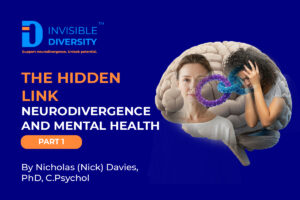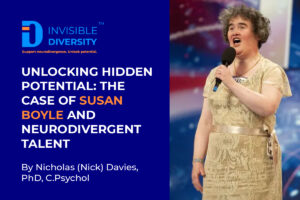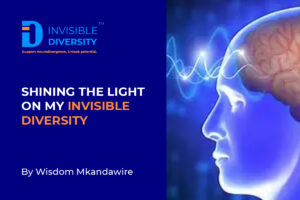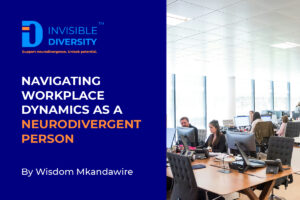In the previous blog we looked at neurodivergence and anxiety. What about depression? People with autism are four times more likely to develop depression, than the general population (Hudson CC, Hall l, Harkness KL Prevalence of Depressive Disorders in Individuals with Autism Spectrum Disorder: a MetaAnalysis J Abnormal Child Psychology 2019; 47(1):165-175.) . It is suggested that it is the most common mental health condition in autistic people.
The reasons for this are many and varied ranging from the managing other physical health challenges through to negotiating the neurotypical world unsupported. Significant psychosocial sequelae are associated with being autistic, including social isolation and difficulties developing and maintaining relationships, challenges succeeding academically and vocationally. The psychological impact of trying to survive, manage and navigating a predominantly neurotypical world, all increase the risk for mood symptoms in autistic individuals and other neurodivergent conditions. Said differently, autistic individuals often face systemic barriers and a lack of support, which can lead to feelings of exclusion, overwhelm, incompetence, limited reward for significant input, and criticism, all leading to low mood.
Negotiating everyday life with autism or ADHD often requires a cognitive rather than intuitive approach. Social interactions, in particular, can feel like solving a complex puzzle in real time (remember the Rubic’s Cube from part 1?). While neurotypical individuals rely heavily on intuition in social settings, autistic individuals often have to consciously analyze and cognitively respond to social cues. This effort can leave them feeling drained and exhausted.
The burden of masking and the attaching cognitive exhaustion must be considered too. Many autistic and ADHD individuals learn early on to mask their differences in order to fit in, to survive. Masking involves suppressing one’s natural way of being in the world to conform to social expectations. While this strategy can help ease the stress and risks in social situations, it’s mentally and emotionally exhausting. Imagine trying to speak a foreign language fluently all day while managing everything else in your life. It’s suggested that’s what masking can feel like for many neurodivergent people. Over time, this chronic effort can lead to burnout—a state of physical, emotional, and mental exhaustion
On the psychological front, masking has the potential to alienate the person from their true self. Societal pressures and expectations create a relentless demand for neurodivergent individuals to conform, leading to a disconnect from their authentic selves. “The Tyranny of the Shoulds” is a phrase psychoanalyst Karen Horney coined in the 1950s. She believed we split ourselves between our ‘idealised self’ and our real self. We bounce between who we actually are and what we believe we “should be”. For the neurodivergent person the tyranny of shoulds is relentless – you should speak more; you should make eye contact; you should shake hands; you should be able to read facial expressions, you should be able to meet deadlines, you should be able to sit still, ….. This constant abandonment of one’s real self can lead to feelings of isolation, identity confusion, and profound sadness. It’s not uncommon for neurodivergent adults to reach a point where they realize they have spent years suppressing their true, authentic selves, resulting in regret and depression.
The words of one of DH Laurence’s poems comes to mind – something along the lines of “I am worn out with the effort of trying to love people and not succeeding…..” With all the challenges that the neurodivergent person has to face, so often unaware of their neurodivergence, and even more often misunderstood and unsupported by those around them, it is not hard to imagine their own words “I am worn out with the effort of trying to live, to fit in, be accepted, get it right, and not succeeding….” This is just another way of saying “I’m depressed”.
So often, because of inappropriate environmental demands, expectations and barriers, the neurodivergent person is left feeling they have failed. In the face of the social challenges of the neurodivergent person, be it their distress related to modulating and moderating their behaviour to meet environmental expectations, the backlash they face because of their frank and direct comment, the inordinate sting of rejection, or the distressing hours spent trying to understand what went wrong in a social encounter earlier in the day, it’s easy to understand how the sense of “this is not working” may well be ever present, ultimately leading to the feeling of “I can’t”; “why bother?”…. and depression.
For adults with ADHD, impulsivity and emotional dysregulation can lead to frequent conflicts and misunderstandings, further compounding stress. When these challenges pile up over time, they can erode self-esteem and contribute to the development of mood disorders.
Back to Laurence’s poem; it continues “Now I’ve made up my mind I love nobody, I’m going to love nobody ….” In the context of this article, it may well explain the neurodivergent person’s mind set after years of trying as they withdraw into depression, and stop loving themselves.
For many neurodivergent individuals, anxiety and mood disorders are not separate challenges but intertwined aspects of their lived experience. By understanding the links between autism, ADHD, and mental health, hopefully we can begin to offer better support and create environments that allow all people, but specifically neurodivergent people to thrive—authentically and without fear of judgment – and become their best selves, relatively free of the burden of anxiety and depression.
Appealing to Laurence one final time, he concludes his poem thus: “And if by a miracle a woman had happened to come along who warmed the cockles of my heart I’d rejoice over the woman and the warmed cockles of my heart so long as it didn’t all fizzle out in talk”. Whether you’re neurodivergent or neurotypical is irrelevant; can you be the person in that autistic or ADHD colleague’s life who warms the cockles of their hearts by doing no more than just understanding their brain, and valuing its difference ….? And ensuring that your support is practical and enduring and doesn’t “fizzle out in talk”!




